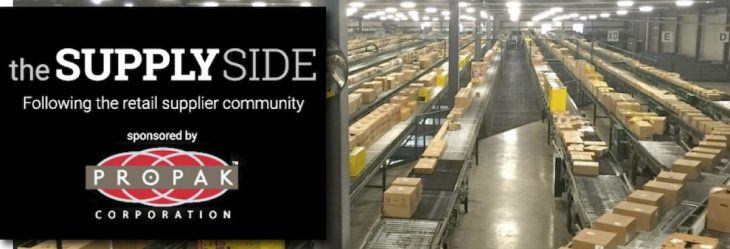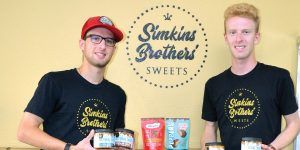The Supply Side: Family recipe launches Simkins Brothers’ Sweets
by August 13, 2018 9:41 am 1,227 views

Fayetteville brothers Austin and Quinn Simkins believe a family recipe handed down for four generations is their key to a national business. At ages 8 and 4, their grandmother began teaching them how to make Chocolate Poppers.
During each holiday season as they grew up, their parents dropped them off at their grandmother’s Fayetteville home where they “became cooks for the night” with her in her kitchen, making hundreds of Poppers to give to friends and family.
Those chocolate-covered peanut butter balls, a desire to start a business and encouragement from Brett Amerine of Fayetteville consulting firm Startup Junkie led to a conversation with their parents and grandmother over Thanksgiving dinner in 2016, and Simkins Brothers’ Sweets was born.
Austin, now 26 and self-described as “passionate and a big dreamer,” was about to graduate with an MBA from the Sam M. Walton College of Business at the University of Arkansas, and he had always wanted to start a company. Quinn, now 22, reserved and analytical and a student at the University of Arkansas majoring in finance and accounting, took a little more persuading.
“I’m glad I talked him into it because there’s no one else I’d rather do this with,” Austin said, adding that each of them brings something different to the business, which makes for a good partnership.
After taking care of the legal side of the business, the brothers set up a website, began production out of their grandmother’s kitchen and handed out free samples at the Fayetteville Farmers’ Market. As they got feedback from the public, they tweaked the taste of the Poppers and the product’s packaging. They said some of the best advice they’ve been given is to test, learn from it, make adjustments and test again.
The brothers consider the product’s major competitor to be Brookside or Flint Chocolate, and not Reese’s Peanut Butter Cups, which had $171.6 million in sales and was the top ranked snack size chocolate candy brand in the country in 2017, according to Statista. The U.S. confectionary market is projected to reach $38.1 billion in sales by 2020.
EXPANDING THE PRODUCT LINE
In considering additional products, the brothers wanted to offer healthier options to reflect their lifestyles as runners. They came up with an all-natural peanut butter — made with olive oil instead of palm oil — in original, bacon, chocolate swirl and honey flavors.

Last year, 290 million Americans consumed peanut butter, and Nielsen found consumers want foods that promote good heath and are deemed all natural. The brothers also envisioned offering a healthier, “protein Poppers” product. As they began to research protein, they stumbled across cricket flour and were excited to see Mark Cuban — the billionaire owner of the NBA’s Dallas Mavericks — on the television show “Shark Tank” buy into two products containing it.
The flour is made by milling crickets, resulting in a fine grain, high protein powder, which is high in fiber, has all nine essential amino acids, twice as much protein as beef and is more sustainable. Their resulting product was Chirpies, a sweet peanut, chocolate and cricket flour snack. With Cuban’s connection to cricket flour products, Austin and Quinn are hoping to explore a deal to sell Chirpies at Mavericks games. At both the NBA’s Atlanta Hawks and the MLB’s Seattle Mariners stadiums, cricket tacos are for sale.
“When the Hawks debuted them, there was a 45-minute wait to get those tacos,” Austin said.
The brothers would like to see Chirpies, and possibly Poppers, offered for sale throughout the NBA, NFL and NHL.
The Simkins’ products are sold on their website. Harps Foods, began selling them in February at $2.99 for Poppers, $3.99 for Chirpies and $5.99 to $6.49 for the flavored peanut butters. Richard’s Meat Market, Ozark Natural Foods, Allen’s Food Market and Snack Lab also carry some of their products.
MORE DISTRIBUTION CHANNELS
In April, all four Malco Theatres in Northwest Arkansas began selling Poppers. The chain will add seven more theaters in Tennessee, Mississippi and Louisiana in August, with the future option to add all theaters.
Quinn estimates Poppers sell close to 1,500 to 2,000 units per month. Chirpies and the peanut butters, which were released for sale a month ago, are tracking at about 500 to 1,000 units per month and 1,000 to 1,500 units per month, respectively.
The brothers recently participated in a Sam’s Club Road Show and believe that will eventually help them get their products into Walmart and Sam’s Club. Several brokers have contacted them, but the brothers know they are not ready for that kind of volume. However, they are in the process of completing food certifications and food safety audits to clear them to sell to any big box retailer.
Austin and Quinn handle all production themselves, believing that being hands-on in every aspect has helped them learn the business, which brings value and gives them control to develop new products. They continually buy new machinery to help increase volume. Warehousing and production takes place in their 878-square-foot storefront in Fayetteville, where they moved six months ago.
In marketing their products, the brothers focus on their story, the quality of their products and the packaging. At present, the brothers don’t have money to advertise formally, so they use social media and email. When they are able to handle added sales volume, they anticipate promoting through several national health conscious influencers who are excited about the products.
While they declined to give a startup dollar amount, they cited Brett Amerine of Startup Junkie, who said, “Until you hit $50,000 invested, you haven’t really done much.” They believe it.
Many startups bring in an outside investor or secure a line of credit from a bank, but the Simkins didn’t want to do either in order to retain complete control of the business for as long as possible. Instead, they are funded by money saved from birthdays and summer jobs, and they’re willing to put in hard work. They receive no salary and regularly put in 70- to 80-hour weeks.
“We’re both driven by success, but more than that, we enjoy it,” Quinn said. “It doesn’t feel like a real job. You come in and you have fun with the process, and it’s like a game. We’re trying to build something from nothing.”
“We’re not really business owners. We’re problem solvers,” Austin added. “We’re problem solvers that happen to have a business. You have an end goal, but there’s three problems in your way to get to that goal. So especially with a tight budget, you have to be creative with ways to get around a problem.”
The brothers say they don’t come in the door in the morning expecting small things to happen. They expect the business to grow five to seven times in revenue this year, and their plan is to be a national brand in three to five years.
––––––––––––––––––
Editor’s note: The Supply Side section of Talk Business & Politics focuses on the companies, organizations, issues and individuals engaged in providing products and services to retailers. The Supply Side is managed by Talk Business & Politics and sponsored by Propak Logistics.
